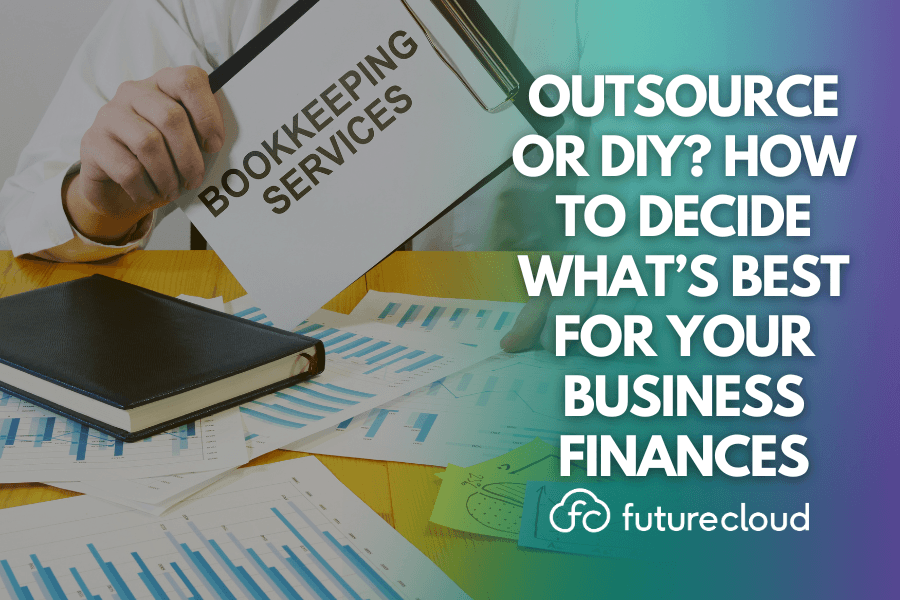As a business owner, managing your finances is crucial, but it can also be time-consuming and complex. Two of the most common tasks that often raise the question “Should I do this myself or hire someone else?” are bookkeeping and payroll. Many business owners find themselves wondering, “Is it worth outsourcing my bookkeeping or payroll?”
At Future Cloud Accounting, we understand that every business is different. What works for one company might not suit another. So, in this post, we’re breaking down the key considerations to help you decide whether to DIY your financial admin or outsource it, and why this decision matters.
What Are Bookkeeping and Payroll?
Before we dive into the pros and cons, let’s quickly clarify what these tasks involve:
- Bookkeeping is the ongoing recording of all your business’s financial transactions, sales, purchases, receipts, and payments. Accurate bookkeeping means your accounts stay up to date, giving you a clear picture of your business’s financial health.
- Payroll is managing employee payments, including calculating wages, deducting taxes and National Insurance, and ensuring everyone is paid on time and correctly.
Both are essential functions that, if done incorrectly, can lead to costly mistakes, penalties, or cash flow problems.
When does DIY Bookkeeping and Payroll Make Sense
Many small business owners start by handling these tasks themselves, especially when their businesses are just getting off the ground. DIY can be tempting because:
- Cost-saving- Not paying a third party means lower overheads.
- Control – You’re directly involved in every financial detail.
- Learning experience – You gain valuable insights into your business finances.
If your business is very small with straightforward transactions, and you have some basic financial knowledge, DIY bookkeeping and payroll can work well, especially if you use simple software like QuickBooks, or Xero.
Why Outsource Bookkeeping and Payroll?
On the other hand, outsourcing these tasks to a professional accounting or payroll service has distinct advantages:
- Expertise and compliance – Financial rules and tax laws in the UK can be complex and change frequently. Professionals keep up to date with regulations like Making Tax Digital (MTD) and Real Time Information (RTI) reporting, reducing your risk of errors or fines.
- Time-saving – Outsourcing frees up your valuable time so you can focus on growing your business, rather than getting caught up in the day-to-day admin of bookkeeping and payroll.
- Accuracy and reliability – Experienced bookkeepers and payroll experts know what to look for and can quickly spot inconsistencies or potential issues.
- Better financial insights – With accurate bookkeeping, you get timely management reports and cash flow forecasts that help you make informed business decisions.
- Peace of mind – Knowing that your finances are in the hands of professionals can reduce stress and give you confidence come tax time.
Factors to Consider When Deciding
When deciding whether to outsource or DIY, think about:
- Business size and complexity – If you have multiple employees, complex transactions, or are growing fast, outsourcing might be the better option.
- Your skills and time – Do you enjoy financial tasks? Do you have the time to dedicate to bookkeeping and payroll? If not, outsourcing can save you valuable hours.
- Budget – While outsourcing comes at a cost, consider the value of your time and the potential costs of mistakes.
- Technology – Are you comfortable using accounting software? Many outsourced services also use cloud-based tools that give you real-time access to your financial data.
- Future plans – Think long term. As your business grows, your bookkeeping and payroll needs will become more complex.
How to Get Started with Outsourcing
If you decide outsourcing is the right path, here are a few tips:
- Choose a qualified provider – Look for firms with expertise in your industry and knowledge of UK financial regulations (that’s us).
- Discuss your needs clearly – Be upfront about your business size, number of employees, and specific requirements.
- Understand pricing – Some firms charge fixed fees, others hourly rates. Make sure the costs fit your budget.
- Check software compatibility – Ensure your provider uses or supports software you’re comfortable with.
- Maintain communication – Regular updates and reports will help you stay in control and informed.
Final Thoughts
Your decision depends on your unique situation. But remember, these are foundational to your business’s financial health, so getting them right matters. If you ever feel overwhelmed or unsure, it’s always a good idea to speak to a professional accountant who can guide you.
At Future Cloud Accounting, we’re here to help you make the best choice for your business finances, so you can focus on what you do best, running your business. Get in touch today to learn more about our bookkeeping and payroll outsourcing services tailored for UK businesses.
Email us at info@future-cloud.co.uk
And don’t forget to follow us on social media for the latest updates, tips, and more!


